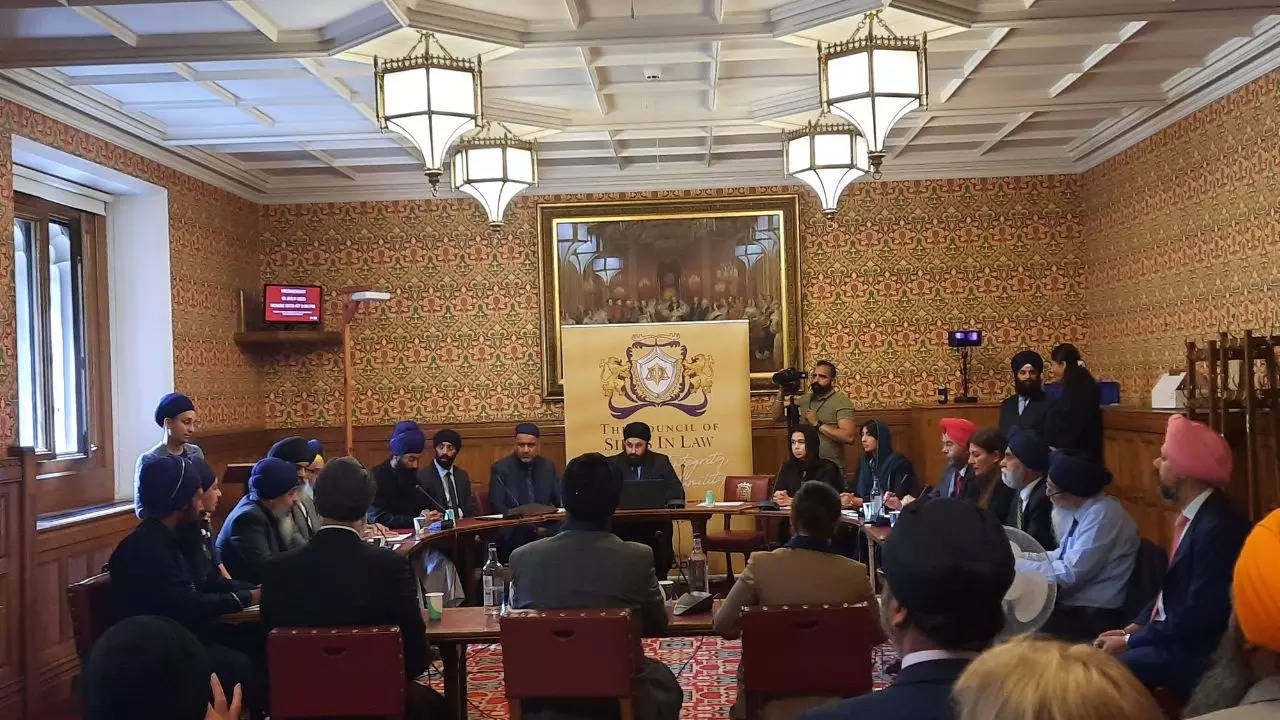LONDON: A group of Sikh lawyers in Britain has slammed the Bloom Review, the UK government-commissioned independent review into how it should engage with people of faith, saying its chapter on “faith-based extremism”, which devotes 13 pages to Sikhs, is “colonialist”.
A “select committee” was appointed by the UK Sikhs in Law association to undertake a review of the report — owing to grievances from the community as to how they were targeted — and the findings were presented in a committee room of the House of Lords on Wednesday. The committee said it found “no evidence of extremist behaviour” and “no terrorist evidence” within the Sikh community.
In the report, published on April 26, the author, Colin Bloom, referred to “Sikh extremism” and “Hindu nationalism”.
Presenting the committee’s findings, Sikh judge Professor Satvinder Singh Juss questioned why it was “never Sikh nationalism and never Hindu extremism”.
He also slammed Bloom for using the word “subversive” to describe some Sikhs.
“Bloom presents no evidence that Sikh activity in the UK — where freedom of expression is rightly recognised — is designed in any way to damage the UK government or its political system. This report is a blueprint of how the government should not engage with faith,” Juss said, accusing Bloom of being “not independent, nor impartial and not a scholar of religion”, and pointing out he previously served as as executive director of the Conservative Christian fellowship and director of Christians in Politics.
Juss said the Evangelical Alliance was troubled by biblical references in the report such as “apostate” and “heretic”.
Juss also criticised Bloom’s reference to “belief”, saying it was central to Judeo-Christian tradition but “absent in Eastern religions”.
“Christians comprised nearly half (47.1%) of Bloom’s respondents yet there was little about Christians in the review. Hindus made up 12% of respondents, whilst Sikhs came behind atheists and pagans at 1.69%, numbering 354 respondents,” he said, pointing out there were more than 500,000 Sikhs in England.
He criticised Bloom for saying there is no religious authority for Sikhs in the UK. “The Akal Takht has a particular autonomy but no authority over a gurdwara in Bihar,” Juss said.
“This idea that you have to have one single body is a colonialist view. Why not engage with all the diverse colours of the Sikh community,” Juss said.
The only evidence Bloom gave for subversive activities was the campaign for an ethnic Sikh tick box and gurdwaras protesting against Covid restrictions, he said. “Why is that subversive,” Juss asked.
MP Preet Kaur Gill said “labels like pro-Khalistan extremism should not be used to describe a legitimate right”, adding that she would make sure the report was shared with Labour and the Conservatives at the highest level. MP Tan Dhesi said: “We are not dealing with a big problem of Sikh extremism in UK.”
But Lord Singh of Wimbledon disagreed and said he knew “of people who have been threatened and beaten up…”
A “select committee” was appointed by the UK Sikhs in Law association to undertake a review of the report — owing to grievances from the community as to how they were targeted — and the findings were presented in a committee room of the House of Lords on Wednesday. The committee said it found “no evidence of extremist behaviour” and “no terrorist evidence” within the Sikh community.
In the report, published on April 26, the author, Colin Bloom, referred to “Sikh extremism” and “Hindu nationalism”.
Presenting the committee’s findings, Sikh judge Professor Satvinder Singh Juss questioned why it was “never Sikh nationalism and never Hindu extremism”.
He also slammed Bloom for using the word “subversive” to describe some Sikhs.
“Bloom presents no evidence that Sikh activity in the UK — where freedom of expression is rightly recognised — is designed in any way to damage the UK government or its political system. This report is a blueprint of how the government should not engage with faith,” Juss said, accusing Bloom of being “not independent, nor impartial and not a scholar of religion”, and pointing out he previously served as as executive director of the Conservative Christian fellowship and director of Christians in Politics.
Juss said the Evangelical Alliance was troubled by biblical references in the report such as “apostate” and “heretic”.
Juss also criticised Bloom’s reference to “belief”, saying it was central to Judeo-Christian tradition but “absent in Eastern religions”.
“Christians comprised nearly half (47.1%) of Bloom’s respondents yet there was little about Christians in the review. Hindus made up 12% of respondents, whilst Sikhs came behind atheists and pagans at 1.69%, numbering 354 respondents,” he said, pointing out there were more than 500,000 Sikhs in England.
He criticised Bloom for saying there is no religious authority for Sikhs in the UK. “The Akal Takht has a particular autonomy but no authority over a gurdwara in Bihar,” Juss said.
“This idea that you have to have one single body is a colonialist view. Why not engage with all the diverse colours of the Sikh community,” Juss said.
The only evidence Bloom gave for subversive activities was the campaign for an ethnic Sikh tick box and gurdwaras protesting against Covid restrictions, he said. “Why is that subversive,” Juss asked.
MP Preet Kaur Gill said “labels like pro-Khalistan extremism should not be used to describe a legitimate right”, adding that she would make sure the report was shared with Labour and the Conservatives at the highest level. MP Tan Dhesi said: “We are not dealing with a big problem of Sikh extremism in UK.”
But Lord Singh of Wimbledon disagreed and said he knew “of people who have been threatened and beaten up…”
